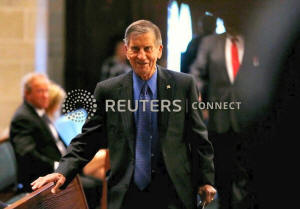|
A left wing, Lindsay played 17 years in the NHL
-- 14 of them in Detroit, where he was a member of four Stanley
Cup-winning teams. Around the league, he was known for being an
enforcer on the ice, earning the nickname "Terrible Ted."
His family issued a statement Monday announcing his death. It
read, in part:
"Red Wings legend Ted Lindsay passed away peacefully this
morning at his home in Oakland, Mich. ... Ted was a persistent,
courageous and determined man both on and off the ice. He was a
man of many firsts. We are comforted in knowing that the Ted
Lindsay legacy will forever be a part of history."
Tributes poured in Monday.
"The Detroit #RedWings are saddened to learn of the passing of
Ted Lindsay, one of the most iconic players in franchise history
and an integral figure off the ice who helped shape hockey for
decades, who passed away today at the age of 93. #RIP7," tweeted
the Red Wings, who changed their Twitter profile photo to honor
him.
Commissioner Gary Bettman added in a statement:
"The National Hockey League mourns the passing and celebrates
the incomparable life of the legendary Ted Lindsay. One of the
game's fiercest competitors during his 17-season NHL career, he
was among its most beloved ambassadors throughout the more than
five decades of service to hockey that followed his retirement.
In Detroit, he was a civic icon."
With the Red Wings, Lindsay joined Gordie Howe and center Sid
Abel on what was known as the Production Line.
A native of Renfrew, Ontario, Lindsay signed with Detroit in
1944 at age 19 and played there until 1957. With the Red Wings,
he appeared in 862 games, scoring 728 points (335 goals, 393
assists). He won the Art Ross Trophy in 1949-50 when he led the
league in scoring with 78 points.
Off the ice, he was among the organizers of the early NHLPA in
1957.
Lindsay was an eight-time All-Star and played his final three
seasons in Chicago, appearing in 206 games and scoring 123
points (44 goals, 79 assists). A statue of him that stood at Joe
Louis Arena was moved to Little Caesars Arena in Detroit.
He was inducted into the Hockey Hall of Fame in 1966 but refused
to go to the enshrinement ceremony because wives weren't allowed
to attend. The rule was changed the following year.
--Field Level Media
[© 2019 Thomson Reuters. All rights
reserved.] Copyright 2019 Reuters. All rights reserved. This material may not be published,
broadcast, rewritten or redistributed.
Thompson Reuters is solely responsible for this content.
 |
|






